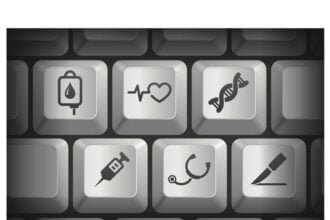The Internet has transformed every aspect of health care. Online communities provide new forms of support for people with a thousand different medical conditions. Email has streamlined communication between stakeholders in the system. Electronic medical records and social networking sites hold a wealth of data that can be leveraged to study the effects of various treatments.
The Internet has transformed every aspect of health care. Online communities provide new forms of support for people with a thousand different medical conditions. Email has streamlined communication between stakeholders in the system. Electronic medical records and social networking sites hold a wealth of data that can be leveraged to study the effects of various treatments.
The most significant advance however, has been the ease with which people can access information about their health. As many as 74% of all people search for information about their symptoms and treatments online, and many of these information-empowered people now see physicians as guides to and interpreters of this information, a far cry from the era in which passive patients presented symptoms and relied on paternalistic physicians to act in their best interests.
But there are problems with the new paradigm, just as there were with the one it replaced. Online health information can be incomplete, biased, lacking for proper context or flat-out inaccurate. And not everyone, especially those without a medical background, can sort through these deficiencies in a way that assures they are properly informed.
A recent study by Alexander van Deursen and Jan van Dijk of the University of Twente has quantified these problems. The scientists used performance tests to assess health-related Internet search and other online skills in a representative sample of the people in the Netherlands.
Their tests focused on four types of skills:
Operational-These were basic internet skills like opening a health website, saving a PDF file and adding a website to a list of “favorites.”
Formal-These included navigating health-related menus and websites and surfing a list of websites.
Finding Information-These included specific medical conditions and answering specific questions like whether it is appropriate to begin a treatment after being infected with a particular germ.
Strategic-These included extracting information from different sources and, making decisions based on the information. For example, “find out whether it is wise to give a 3-year-old boy Vitamin A and D.”
On average, study subjects successfully completed only 73% of the operational skill tasks and 73% of the formal skill tasks. They completed only 50% of the finding information tasks. An abysmal 35% used their findings strategically.
Only 28% of the subjects successfully completed all operational skills tasks, 39% completed all formal skills tasks, 13% completed all information skills tasks, and 20% completed all the strategic skill tasks. There was substantial variation in the time required to complete any particular task successfully.
According to the scientists, age and educational level were strong predictors of success with operational and formal Internet skills. In the latter case, years of Internet experience was also somewhat predictive. When it came to information finding and strategic internet skills, educational level was the most important predictor of success.
What Should We Make of This?
The study, if it can be generalized, suggests that a surprisingly large fraction of the general population lacks basic Internet skills needed to keep pace with the explosion of online health information and services. Many more, including a surprisingly large number of younger folks, had problems finding information on the Internet and using it appropriately. In the latter group for example, subjects often failed to recognize that key information was missing, that the information they encountered was biased, and that claims made on certain sites were not based on scientific evidence. More pernicious problems included a tendency to focus on finding information quickly rather than information that answers specific questions. Frequently for example, subjects visited only the top-listed links (which are often sponsored) derived from a search.
What Should We Do?
First, we need to recognize there is a problem. I am just as bullish about the great potential of the Internet as the next guy, but this potential will only be reached if we implement policies and procedures that improve Internet skills for the general population. Adult education and computer classes should be made available to teach operational and formal Internet skills, especially for older folks. Similar training in information finding and strategic Internet skills are required for people of all ages. It is dangerous and often flat-out wrong to assume that, just because the Internet has become ubiquitous, people know how to use it properly.
As for the age of the empowered e-patient, this study suggests that millions of people, perhaps tens or hundreds of millions, aren’t quite there yet. Even today, medical professionals must act as curators of credible information. They shouldn’t assume their patients can identify and use evidence-based information from the Internet. Minimally, their job is to steer patients away from the sponsored sites and ones touting miracle cures, and towards the ones which are more reliable and free from bias.







